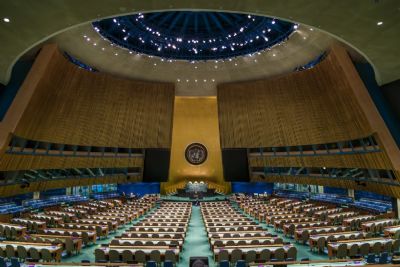"Last week, the New York Times reported that the Trump administration was considering two executive orders to 'drastically reduce the United States' role in the United Nations and other international organizations.' A draft titled 'Auditing and Reducing U.S. Funding of International Organizations' was widely circulated among reporters...
The State Department reports that the United States contributed $10.5 billion to dozens of international organizations in fiscal year 2016. Though a small portion of the overall federal budget, it's a huge amount of money. U.S. officials owe it to the American people to justify that expenditure; making the evaluation transparent is desirable from a good governance standpoint.
The United States should challenge other governments to increase their contributions. The United States pays far more than other countries to support UN organizations. It pays more than 178 other UN member states combined in terms of regular budget assessments, and more than 185 member states combined for UN peacekeeping assessments.
The disparity is even greater for the UN system as a whole-i.e., the regular and peacekeeping budgets plus contributions to UN funds and programs like UNICEF, and UN-specialized agencies, like the World Health Organization. The United Nations System Chief Executives Board for Coordination reports that, for 2014 (most recent year reported), the United States provided more than a fifth ($10.1 billion) of all UN revenues ($48.1 billion). Japan, the second most prolific spender, provided less than 6 percent of UN revenues.
This is the very definition of disproportionate. Not every country need pay the same amount, but it is hardly outrageous for the United States to seek a more equitable allocation of costs. Moreover, more equitable cost sharing would be in the long-term interests of UN organizations. It is unhealthy for them to be too dependent on U.S. contributions. Just witness the alarm that potential cuts in U.S. contributions are causing. A broader base of support helps insulate these organizations from short-term funding disruption....
The claim that, if signed, this draft executive order would 'seriously endanger U.S. foreign policy and national security interests' is, quite simply, hyperbole. In reality, the interests of the United States and the interests of the United Nations are not always congruent, and the United States is entitled to make sure that taxpayer dollars advance American interests, not just fulfill the demands of the United Nations.
Unfortunately, the Left chose to ignore or downplay these legitimate issues. Instead, it focused on the instruction to the committee that it recommend at least a 40 percent reduction in U.S. voluntary funding to international organizations.
Doubtless it would be hard to achieve such substantive reductions in voluntary funding without affecting U.S. interests and foreign-policy objectives. However, it is also hard to conceive that every last dollar of voluntary U.S. spending on international organizations is vital and necessary.
Overall, the draft executive order is sensible..."
February 1, 2017
Trump's Plan to Reduce UN Spending Is a Step in the Right Direction

The UN General Assembly Hall
Date
February 1, 2017
Title
Trump’s Plan to Reduce UN Spending Is a Step in the Right Direction, The National Interest
Author(s)
Brett D. Schaefer
Original Source
